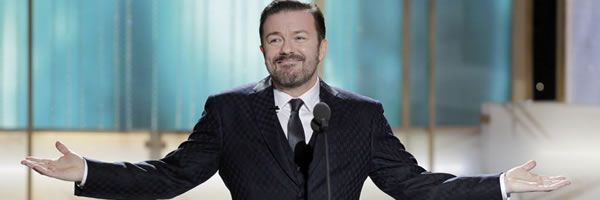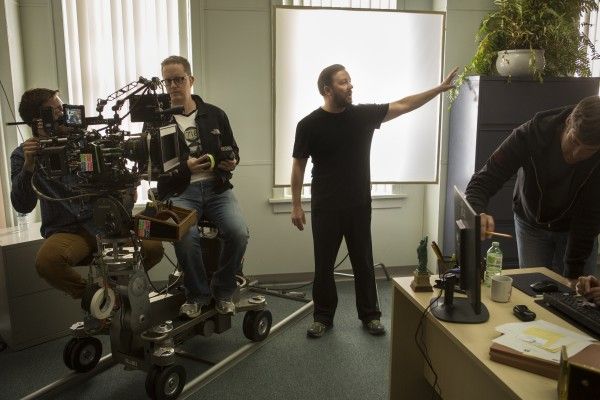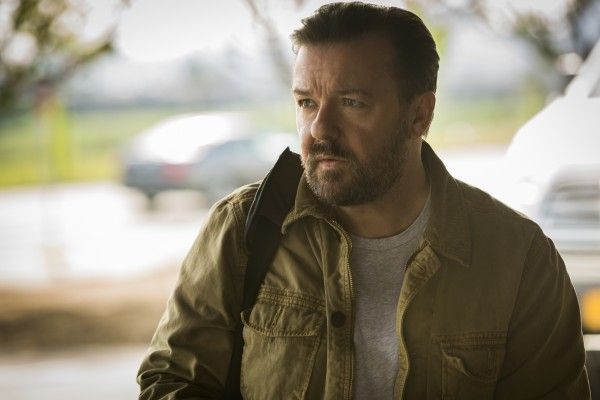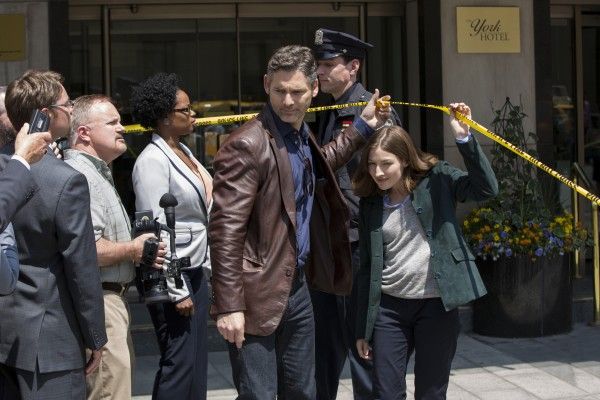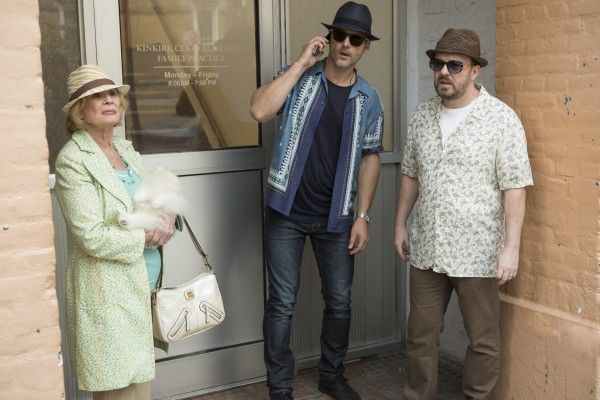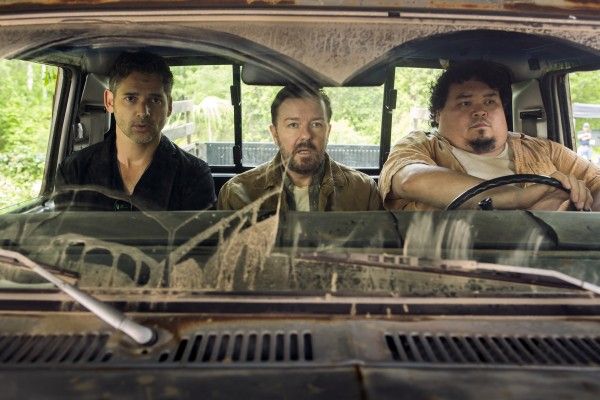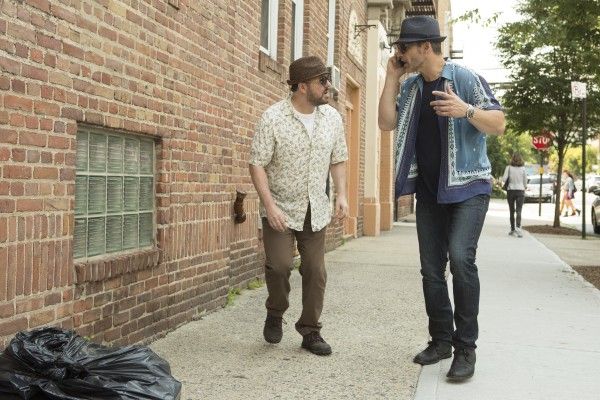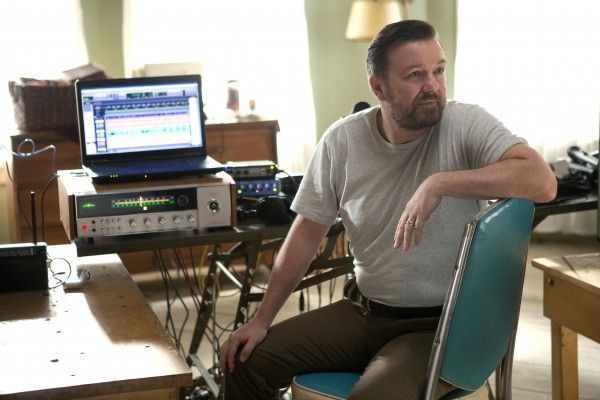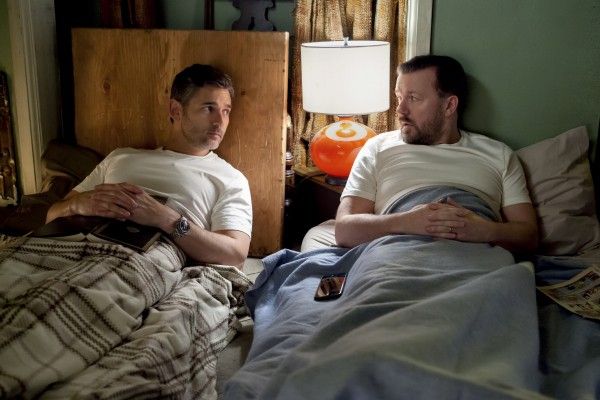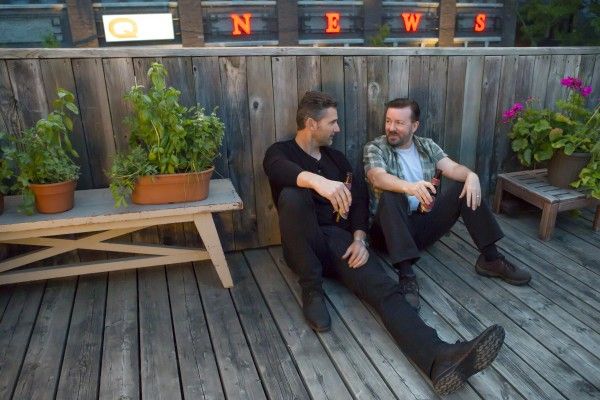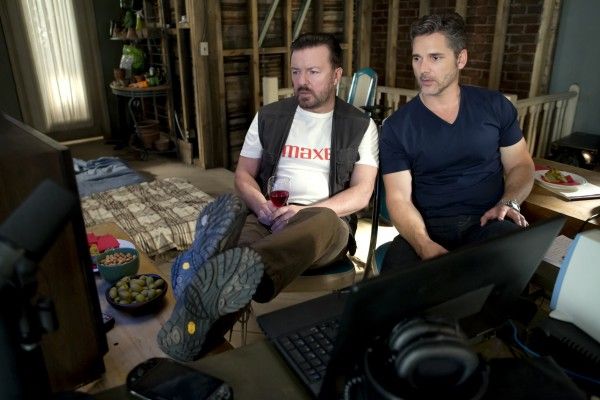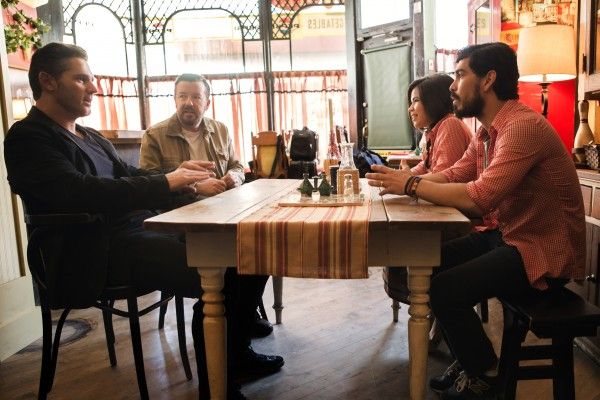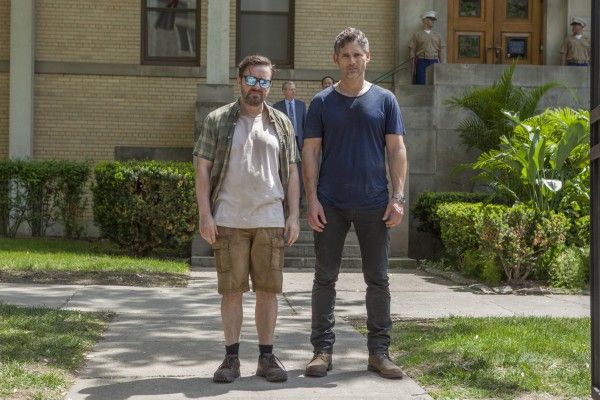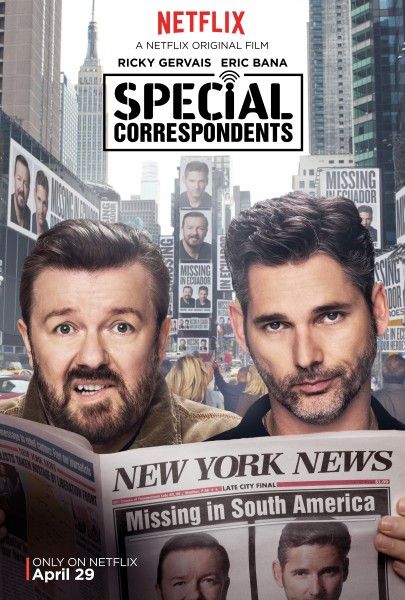Ricky Gervais always makes me laugh. Whether it’s hosting the Golden Globes, his amazing work as David Brent on The Office or Andy Millman on Extras, when he does guest appearances on shows like Louie or Curb Your Enthusiasm, or in his countless other shows and movies, Gervais always find a way to make me laugh out loud. So when I found out I was going to talk with him for his new Netflix movie Special Correspondents (streaming April 29th) which he wrote and directed, you could say I was kind of excited. But nothing could have prepared me for how awesome the interview was actually going to be.
Before going any further, you need to know how interviews normally work. Generally you go to a local hotel and the person you’re going to talk to spends their day answering the same questions over and over again for six to eight hours. If it’s not at a local hotel, you might land a ten to fifteen minute phone conversation, where it’s sometimes hard to get in a rhythm because it’s a phone call.
But for my Ricky Gervais interview, I somehow managed to talk with him on Skype, and what was supposed to be a short 15-20 minute interview morphed into an hour and fifteen minute conversation about everything from Woody Allen to Christopher Guest. Of course we also talked about making his new movie for Netflix, his editing process, why he shoots with two cameras, who gives him honest feedback, his love of This is Spinal Tap, his next movie, David Brent: Life on the Road, if we’ve seen the last of Extras and Life’s Too Short, his thoughts on reality TV, and so much more.
Before getting to the interview, if you’re not familiar with Special Correspondents, it’s a satire of modern news coverage about a New York based radio journalist (Eric Bana) who fakes front line war reports with his technician (Gervais) from a hideout above a Queens’ restaurant. The film also stars America Ferrara, Benjamin Bratt, Vera Farmiga, Raúl Castillo, and Kelly MacDonald. You can watch the trailer here.
Finally, since the interview covered so many subjects, I’m breaking it up into two parts. Below is part one, and later this week look for the second half of our conversation.
COLLIDER: I would have worn a nicer T-shirt than this, as you can tell, I am completely ready.
GERVAIS: I am in an old granddad’s shirt, I just had a bath and I’m very clean.
First of all, thank you so much for giving me your time. Huge fan of your work.
GERVAIS: My pleasure.
(I notice he has a glass of wine) That’s something I want to be doing but I will be doing it at 6 o’clock, my time.
GERVAIS: See, I could be lying. I could be in L.A., but I’m just embarrassed about drinking wine at 10AM in the morning.
What’s interesting about this is you’re doing the white wine, I’m a big fan of the red wine.
GERVAIS: So am I though. I start on white, that's a little treat, it’s like a sunny day and then the big guns come out. Red, you know what I mean? Nine o’clock, watching The Bridge or Occupied or something a bit dramatic and tasty, the lights go down, and it’s red wine.
I’m a big fan of pinot, what about you?
GERVAIS: Yes, I am now. Is this the interview you expected?
Not even a little bit, I like talking –
GERVAIS: Bourgeois, middle class people talking about what red wines they like.
You know what’s funny, I never thought I would be that wine guy, but I’ve really come around.
GERVAIS: No I know, I didn’t either, I was sort of like, I still like beer, but I was beer and chips all the way. But you certainly realize there’s other things in the world.
Yes.
GERVAIS: I even watch things with subtitles, now.
[laughs]
GERVAIS: I’ve changed.
Right, exactly. What’s your go-to karaoke song?
GERVAIS: I don’t do karaoke.
Ever?
GERVAIS: I don’t, no. I don’t. I don’t do karaoke, I don’t dance even at weddings, I’m the grumpy one sitting down drinking wine.
Of course.
GERVAIS: I think I’ve done it once and I did “New York, New York.” It’s an old standard.
One of the things, while watching your movie which made me laugh out loud many times, I enjoyed the fact that your character collected toys/comic books, was that a little nod to the popularity of the superhero genre or was this more about you?
GERVAIS: No, it wasn’t at the time, I wanted him to be a nice soul, I wanted him to be quite naive, I wanted him to be quite childlike, I guess. But I wanted him to be someone who was happy in his space and didn’t hurt anyone. I like the sort of juxtaposition of him playing video games about war and then having to actually do it. I think there is, I suppose there is a parallel there with what’s happening because this is a Netflix movie, I do think it will bring the auteur back to Hollywood because outside Marvel comics and superhero films, Hollywood is Sundance and Tribeca, you know? That’s where the real films are made, by directors, for directors for people who aren’t 14-year-old kids who want a bit of drama. So I think Netflix did it because those films are, they’re made by committee, they’re franchises, they go through so many… The director is almost being told what to do by the twelve studio heads, then they test it, then they change it, it really is quite homogenized. Not all of them, and Hollywood in general, not just superhero films, the blockbusters.
But I think if you want to see something that’s a little bit more auteured and you go to those, you watch those films at Sundance and Tribeca and hopefully now Netflix. Because I don’t have to pander, I don’t have to make sure every idiot who goes likes it or it gets taken out of the cinema on Saturday. There’s not that pressure. So, I’ve always had artistic control, but I’ve usually had to, I suppose, limit my expectations commercially. Even on TV. To get no interference, I went to more fringe outlets, I went to BBC 2, not BBC 1 so I was left alone. I went to Channel 4, not iTV 1, so I was left alone. I went to HBO, not NBC so I was left alone. I do the Golden Globes because they say I can say what I want. I wouldn’t have that at the Oscars. So, as an artist I suppose, you want as many people to see your work as possible, but without compromising it a bit. So, I’ll always not compromise but save for when someone will work with it and not change it. And now Netflix comes along, and it’s the best of both worlds: zero interference, and the sky’s the limit, because you can have network ratings, they’ve got 75 million subscribers, they send an email. I don’t even have to do a million junkets begging people to watch my film, you know? I don’t have to do every single show.
I don’t know how I made the cut, then, so thank you.
GERVAIS: Because I think we’re going to talk about films.
That’s true.
GERVAIS: You know? You’re not going to make me play any games.
Except for the karaoke question.
GERVAIS: Well, yeah. It started off bad…
[laughs] I have a lot of filmmaker friends and they were telling me that they’ve been going to the studios to try to make their movies and recently, an unnamed person who is very, you’ve heard of, told me that Netflix and Amazon offered him more money than he asked for and final cuts to make their movie with one of those services and he’s like, “Well of course I’m going to go this way!”
GERVAIS: Of course. Well, that’s what happened to me. This was a studio film and Netflix came in and not only bought it out, gave us the full budget. But they guaranteed me as the filmmaker what it might have made in the cinema. Because they want it. I’m not going to say what that was, but if this film would have made $400 million worldwide, they’ve got a bargain, but, films can lose money. So, it’s a safe bet for me to get the film. You’re right, it was more than I needed, in fact, we gave some of it back, we came in under budget, I’ve already been paid, and it’s, you know? It’s not just a good business model, it’s a great artistic model. It’s the exact film I wanted with no one quibbling. I can’t lose, I cannot lose. I can’t, if you enjoy the process, I love the creative process, I love every bit of it. Writing, casting, directing, it’s a joy on set, fun and I play and I do short hours. I even love talking about it when it’s educated conversations like this about the craft. I didn’t mean “even,” I mean, I don’t like doing a week of junkets in the hotel and they have to ask what song you do at karaoke or something like that.
Right, I know, exactly.
GERVAIS: [laughs] You’ll never live that down. I’ve made that into way too big a thing.
I was just going to say that I have actor friends who have to do the junkets and they have said to me that by hour six, they’re ready to kill themselves.
GERVAIS: Yeah. I’ve done a few of them, but I say, “If I do that many, I will say the wrong thing. And it won’t be good.” It’s better to do a few good selected things. It gets out there, but with this, I don’t need to do that, I don’t need to compromise the film, I don’t need to beg people to watch it. I want people to watch it because I’m proud of it, and I’ll shout about it now, I’m happy to. And it’s always there. It’s not like word of mouth took two days and it’s out of the cinema, it’s an ongoing thing. This trend’s like a series.
Sure.
GERVAIS: Derek, people are still binge-watching Derek for the first time. They’d never heard of it, and they’ve suddenly got Netflix and watched it. It’s always there. It’s just great. It’s just a great model.
I’m very curious, how long was your first cut versus the finished film?
GERVAIS: Uh, well the assembly was something like 2 hours, 50.
Oh wow. Were a lot of deleted scenes, or that was just everything?
GERVAIS: Well, I shoot with two cameras, because I want a real improv, even if it’s like action or drama, I want that naturalism. And I don’t want ad-lib to go missing because we didn’t have the other side or you had to turn around and waste a whole day relighting something. So I shoot with two cameras whenever I can. It’s twice as fast, you get twice as much stuff, so I always get too much. The Brent movie came in at three hours as well. I cut it to 90. I cut this one to, I think, was it 95?
I want to say it was an hour and 40 minutes.
GERVAIS: Yeah. Yeah, that’s… Ah, yeah, probably with credits. I think that’s about right because it’s a bit more plot than the average comedy. I think comedies should be short, I don’t want to be self-indulgent, I don’t want a two-hour comedy. I lose funny scenes, because I’ll think, “Aw, that’s a lovely funny scene. It won’t be wasted, I’ll use it one day. It’ll be a viral, I’ll stick it on the DVD, but it holds up the story.” So I think, this is longer than I would do. This is longer than the Brent movie, because the Brent movie is more out-and-out comedy with less sort of plot and intricacy. So I think it’s about right. It’s tough, it always depresses me when I see a two-hour cut, like, “Oh, I’ve gotta lose half an hour.” But you crunch and crunch, and then you start taking it out, and then you start being ruthless, and you don’t miss them. Because people watching it for the first time, they don’t know what they missed. Even people around you will go, “Oh, you lost that scene, that was the best scene!” No one knows it existed. You just watch the journey.
I’m curious who you invite for the friends and family screening, who gives you really honest feedback on what you’re creating?
GERVAIS: My girlfriend. She watches nearly every cut, and she helped me write this, she was the script editor on this as well. The people around you, you trust. You choose people, I trust the experts in their field, but then when you’re alone in the edit, it’s difficult. You do need outside eyes. Not many people, really. Because as much as I want people’s input, it can be confusing. Because if you ask ten people, they’ll say ten different things.
Yeah.
GERVAIS: So you choose the things you thought of or that they might be right. It’s difficult, if you’re not going to take a sample and please everyone, homogenized, safe, this is what’s left is what everyone liked a bit. Then You gotta stick to your instinct. And you go through cycles of losing it where you don't’ know what’s funny anymore. And you work it and work it. And even a joke that you thought, “Sick of it, sick of it,” suddenly it becomes funny again, then you know you’ve got it. Even little things like the grade can change it because you see someone’s eyes light up that you didn’t see before. A dub issue where you suddenly hear a little bit clearer, and there’s a silence. Anything can – there’s a little bit of magic, there’s alchemy, some things you can’t plan. Some things you have to find, you know? Some things are, I plan things pretty meticulously but then some things happen by mistake. So, it’s, you’re in the middle of it and it’s a sort of suck it and see. It’s very different because when you do TV and film, you do your best shot and you put it out there and you’re happy about it because it’s what you wanted but you don’t know how it’s going to be received or whether you change your mind the year later or whether someone noticed something you didn’t. Whereas stand up, you go out there and they’re involved in the evolution.
Totally.
GERVAIS: You do fifty gigs, and you’ve had literally tens of thousands of people choose the best laugh for you. If they laugh, it stays in, if they don’t laugh, it goes. So, soon, the world has chosen your best hour and it works everywhere. Now, you can’t do that with a movie, nor would I want to, in a way. And I don’t lose all the gasps, I cherish the gasps as much as the laughs in stand up, as well. So, as long as I know why they’re doing it and know where it’s coming I think you want some shocks and laughs and the round of applause. They all happen the same everywhere. Once you’ve nailed it, once you’ve done that perfect hour, or the best hour you can do, it sort of works everywhere. Whereas, you never know until you put it out there, with a movie. And everyone’s different! It’s so funny. Particularly if you’re doing something, as I say, that’s not made by committee and it’s not even slightly original, the gamut of reaction is huge. That’s why I’ve never really understood, if it’s a real film, someone put their work into and it’s not just fodder, then mixed reviews. Mixed reviews is a good thing, I want to polarize people. There are some people that agree with me and some people that don’t. I want some people to hate it, and some people that love it. I want the right people to hate it and the right people to love it. You know?
I will say though, I want to talk about the casting process, but one of the things that I really love about the Netflix/Amazon model is it does feel like looking from the outside that the mid-range budget or even the talking drama, if you will, has basically died in Hollywood. Because the amount it costs for P&A, to get that movie into theaters is so expensive, that you need a new model like a Netflix or an Amazon, but let’s talk about Netflix because they backed you, to be able to offer this kind of an audience these kinds of movies that are not $100 million an audience. So, I’m very, very happy.
GERVAIS: Well, most people, I think it was Billy Wilder that said, “No one ever said, ‘I’m going to see that movie, I heard it came in under budget.’” No one knows or cares whether it cost $100 million, or $5 million. Was it good or not? Ugh. We’ve got all the innovations, we’ve got CGI now, we’ve got things that couldn’t have been dreamt of when I was a kid. We’ve got $300 million budget movies. Is it a good story? I can watch Laurel & Hardy sitting down and talking to each other for hours. They’re telling me something, they’re giving me something. You know? Whatever happens, what you can never replace, whatever innovation there is, it’ll be one human being telling another human being what happened.
Absolutely.
GERVAIS: That’s the interesting thing. You can be watching the greatest film in the world, and if you hear your neighbor getting into a fight, you’re at the window.
Or car chases.
GERVAIS: You’re, “What’s going on there?” Real life, an investment, someone you know. A story, a real story. You know? I just, I think storytelling is the most – and a story that makes you think as well, that’s life-changing.
Absolutely. I can only imagine what it’s like for you, picking up the phone to ask people to be involved in your movie. How easy is it for you to cast a film?
GERVAIS: With this, this was so funny because I’ve always been my own agent, I’ve never taken a handcuffs deal, I was offered a handcuffs deal from the BBC and I’ve always said, “No.” Respectfully, because I want to be my own agent. I think it keeps everyone on their toes. And about, must’ve been about five years ago, this Netflix cropped up. And I knew them from when they were just a video service, delivering and all that. I heard people start worrying about this Netflix. Cable channels stopped arguing amongst themselves and started worrying about this Netflix. I thought, “That’s interesting.” I thought, “That’s going to be the future.” And I got my agent and I said, “Who’s in charge? Get me his email.” So I sent the email to Ted Sarandos, and I wrote, “Dear Ted, I think Netflix is the future. I want to do my next series with you.” He sent back, “We’ll take it.”
[laughs] That’s awesome.
GERVAIS: Later I’d found out that they’d tested algorithms, they’d seen that my things, and they’d done it with things on YouTube and found out things that bootleg well, and what names crop up. So even before they knew what it was and I sent them a pilot of Derek and they went, “Yeah,” and we did it. But this I didn’t go to them. This was going to be a studio movie. I did the script and I sent it off and it got a great reaction, there was even a little bit of a bidding war. And we even signed to do – and I got a call from my agent that said, “Netflix wants to buy it out.” They bought out the studio, bought the film, gave us full budget, and said, “And they’re going to give you some backend, what you might make at the cinema.” Jesus, yes.
Sold!
GERVAIS: And I loved them, I knew them all. I’d worked with Ted. And then I got a call from Christopher Guest who’s been my mentor for 15 years and said, “What are Netflix like to work for?” And I said, “They’re brilliant. They really are good.” And I thought, “Oh, I hope it goes well, he’s worse than me.” And I met him in L.A. a couple months ago, and I said, “How was it?” And he said, “It was the best experience of my life.” And I thought, “Phew, well that’s good.” You love it when a recommendation goes well. I remember when early days, ‘cause Christopher Guest, Spinal Tap was a huge influence, he was probably the biggest single influence on me, and his biggest influence is Laurel & Hardy as well, and we always talk about that and the relationship between them, we send each other little things. Just that naturalism, saying stupid things but very naturally. And Spinal Tap, a mockumentary just like The Office. And I remember calling him once after a movie I’d done and I said, “They want to do a focus group.” And I went, “I don’t want to do it. I don’t want to have to do it.” And he went, “Well, why would you? If you’re listening to their opinion in the editing process, next time why don’t they write it with you?” And I thought, yes. I went, “Cheers, that’s it. It’s perfect.” So, yeah.
Spinal Tap is one of my all-time favorite films.
GERVAIS: My favorite comedy of all time.
It’s so brilliant on so many levels it doesn’t make sense.
GERVAIS: It doesn’t make sense. It’s too good.
It is.
GERVAIS: I’ve told him, because he doesn’t remember stuff, it was like actually all ad-libbed within a framework. Which, I don’t do that. But yeah it’s remarkable. Every little thing adds to another thing. But the crafting of it is remarkable because it could have been, usually, we try to do a few things in England there’s been a few improv, and they are nauseating. It’s just showing off, never wanting to leave the scene. You’ve got to be good to do that sort of thing. You’ve got to really craft it well.
Well one of the things about Spinal Tap I think that is, I think people don’t acknowledge how good the music.
GERVAIS: Yeah.
It’s really good music that ties into a brilliant mockumentary.
GERVAIS: It’s great, it’s so — and again, I tried to do that with the David Brent movie.
That’s what I wanted to ask you.
GERVAIS: Because David Brent, he doesn’t write ridiculously stupid comedy songs, he’s not an awful singer, it’s just that it’s inappropriate. It was inappropriate in The Office when he was supposed to be leading a team, it’s inappropriate now that he’s a 55-year-old rep who’s paying through the nose, he’s cashing in pensions, he’s hired session musicians. So the music’s great, it’s just no one’s going to sign a 55-year-old rep dancing around singing songs like “Lady Gypsy,” and “Native Americans, It’s About Time Somebody Said Something,” and “Equality Street.” It’s just all wrong! Even if he was as good as Springsteen. He’s not Springsteen. And it’s strange because the world is worse now, it’s more tragic than in The Office. In The Office he was 39, 40, going through a bit of a mid-life crisis, but he was basically in a group of nice people, but now, 15 years later, he’s mid-50s, he’s not the boss, he’s in the office with alpha males. Now we’re in a time where people get on The Apprentice by saying, “I will destroy anyone who stands in my way.” You know? Now he’s almost bullied, it’s almost more tragic. But he’s seen 10 years, 15 years of reality shows where he thinks anyone can become famous for a minute. He’s seen America’s Got Talent, American Idol. He’s seen people get famous for just taking their clothes off. He’s seen people on YouTube get a million hits for doing a funny dance or a cat falling on their head. And he thinks, “I can do it now. I can do now.” And fame’s even more important than it was. Now it’s insatiable, now you’ve got 10-year-olds. In a survey amongst 10-year-olds, people said “What do you want to do when you grow up?” And they said “be famous.” Not even be a pop star or a footballer, it’s gone crazy.
I agree.
GERVAIS: And so it’s even more tragic. He's almost more likable now, David Brent, because he’s the underdog much more.
I am desperately awaiting seeing the movie. I’m so fucking excited to see what this thing is going to be. When are people going to get a taste? To see footage, hear the music…
GERVAIS: Well, the teaser trailer is actually dropping tomorrow. But it really is just a teaser. It’s a tiny bit of Brent, it might not even make sense, but you’ll see that he’s the same but different. He’s the same but older. It’s the same but different. And then I think a proper trailer maybe in May. And then we’re going to release the first single before the film, the Lady Gypsy with a video that’s about his first love, it’s about when I lost my virginity to a gypsy, a lady gypsy. And it’s just this odd folk fantasy where he’s walking through the woods and spying on a girl, and it’s really great. And then we’re going to release another single called “Life on the Road,” another track, which is actually about him repping and all about him going town to town selling tampons. But, again, it’s a great rock song. And I like the sort of play on words that it’s “Life on the Road” and you think that’s a rock ’n’ roll reference, but actually it’s about him repping.
Have you shown the film to Christopher Guest yet?
GERVAIS: No.
When is he going to see it?
GERVAIS: I can’t wait. I can’t wait. I love him and I want him to love it. And I think he will, I think he will…Secretly, I hope he appreciates the homage, as well. Because The Office wouldn’t exist without him, really. Even though I worked in an office for ten years and I do, and I owe a lot to him and Garry Shandling, and Laurel & Hardy. But, yeah, he’s sort of been a mentor and a friend and he loved The Office and we bonded over that. He loved Derek as well, but I really can’t wait for him to see the Brent movie.
I’m also curious, I put on Twitter that I was going to be talking to you and a lot of people wanted to know about previous series you’ve done like Life’s Too Short and Extras, and all the things that you’ve been involved with. Are there future editions of any of these things coming?
GERVAIS: No, I think the difference…I don’t know, never say never. But I think a winning formula for me has been two series and a special. Because I think that’s the perfect arc. And when you think when I say a series, I mean three hours. With each series, I give them, what is that? Seven and a half hours of TV. That’s not even half the series of an American series. But I think it’s like a long epic movie over three years. I wouldn’t bring The Office back, that would really beg credibility that all the same people are sitting at the same desk in an office, that’s no. But I dunno, I don’t think so. I think this is the only… I might bring Derek back for the odd charity thing, but I’d say no, I think this is the odd one out. And it’s mainly because the music more than the characterization. Because there is a life, it’s so different, it’s about a dream. If The Office didn’t exist, this could be a standalone movie. It’s got the delusional man, it’s got midlife crisis, it’s almost got The Rebel, you know The Rebel with Tony Hancock?
I have not seen The Rebel.
GERVAIS: It’s a ‘60s movie where Tony Hancock plays a guy who works in an office. He’s really bored and he wants to become an artist so he moves to Paris to become an artist. And it’s sort of a, it’s about that small man, pretension. The biggest stake of comedy is a normal guy, person, trying to do something he’s not equipped to do. We’re laughing at the blind spot, we’re laughing at someone struggling. We’re laughing at these big dreams. We sort of see ourself, we sort of want him to win but we don’t want him to win because it’s funny when he falls over. But we want to get him back up again, that’s good, get back up, because then you’ll fall over again. So, this would be, even if you haven’t seen The Office or know David Brent, it’s a poor middle-aged man in a drab job who dreams of being a pop star. It is the ultimate modern dream.
Well, one of the things that I think is really cool is it sounds like you’re going to be incorporating not only real time but how much YouTube, and what fame is over the last decade.
GERVAIS: I’ve always been fascinated with fame, I always feared it. I always didn’t know why people, I’ve never asked for an autograph, I don’t understood why fame per se was the important thing. I admired people who did great things whether they were famous or not, and if they were famous it was because they were doing great things. My heroes growing up were people like — I was a boring child — were people like Charles Darwin and Sir Isaac Newton. I had pop heroes, but because of what they did. Muhammad Ali was probably my first pop hero so to speak. And then 14, 15 you start liking things that you really admire in more popular [culture], David Bowie and Laurel and Hardy, but I’ve never really understood fame per se. But it’s got worse now, it has got worse. And The Office was always sort of about TV in itself. There was a fake documentary that went out on television like a real documentary that some people thought was a real documentary. So, yeah, I’ve always been a slave to realism. I think it resonates more. Reality, realism, naturalism. But yeah, the world has changed drastically in the last 15 years. It’s harsher. Everyone’s been sold a lie. It’s like everyone wants to be a singer. We see them on talent shows going, “It’s my dream.” And I think, “What does that got to do with me? Why are you begging me to make your dream come true? What does that got to do with me? Vote to make you a pop star? Really? Alright. It’s not going to last, but alright.” We’re going to run out of doctors soon, everybody’s going to be a fucking singer. You know what I mean?
You’re not wrong. It disturbs me what has happened with reality TV and everything else because I think people are chasing fame rather than a talent.
GERVAIS: It’s a shortcut. They think it’ll sort their life out. It’s always been going that way. I mean Andy Warhol couldn’t have dreamt how prophetic his statement was. But now it’s really weird, there’s no difference now between fame and infamy. There’s people who would rather be known for being an absolute fucking nightmare than not known at all. You see it on Twitter. Trolls. They just want to get noticed. They say horrendous things just to get noticed. There are journalists who are trolls now. That do clickbait. We’ve got journalists that say horrendous things and they suddenly realize they’re on telly to defend themselves. “I’m on telly, I’ll be the witch. I’ll be the evil person, I’ll play Hitler if it makes me fucking famous.” Do you know what I mean?
If I ever get like that please just punch me in the face.
GERVAIS: Well, honestly. It is tempting because you know, people think, “I’ve been trying hard and all I had to do was be nasty loudly.” Most of the internet and TV is shouting out of the fucking window, “Notice me!” It’s really odd. I don’t know what that generation thinks, that it’s cool to be globally hated but you’re famous.
I think it also stems from the 24/7 news cycle that currently exists. When I was younger, you would have the weekends off, essentially. But now with the constant churning of content where you always need to have something, it’s disturbing.
GERVAIS: Yeah, bad news is good news. Yeah, of course.
Look for part two of my exclusive interview with Ricky Gervais later this week.

